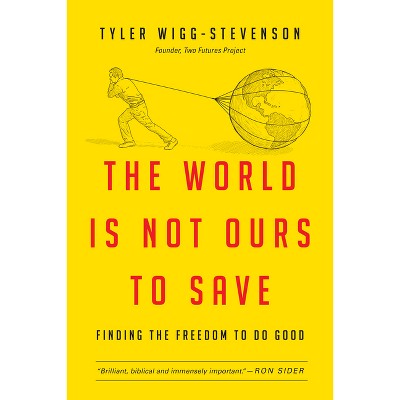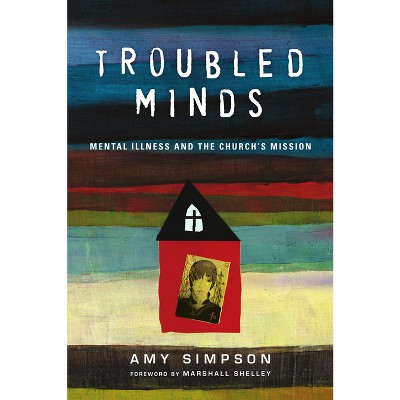About this item
Highlights
- The Gospel Coalition Book AwardWhat does the good news of Jesus mean for economics?Too often, Christian teaching and ministry have focused only on the gospel's spiritual significance and ignored its physical, real-world ramifications.
- About the Author: Tom Nelson (DMin, Trinity Evangelical Divinity School) is president of Made to Flourish (MTF), a network that seeks to empower pastors to lead churches that produce human flourishing for the common good.
- 222 Pages
- Religion + Beliefs, Christian Life
Description
About the Book
What does the good news of Jesus mean for economics? Marrying biblical study, economic theory, and practical advice, pastor Tom Nelson presents a vision for church ministry that works toward the flourishing of the local community, beginning with its poorest and most marginalized members and pushing us toward more nuanced understandings of wealth and poverty.
Book Synopsis
The Gospel Coalition Book Award
What does the good news of Jesus mean for economics?
Too often, Christian teaching and ministry have focused only on the gospel's spiritual significance and ignored its physical, real-world ramifications. But loving our neighbor well has direct economic implications, and in our diverse and stratified society we need to grapple with them now more than ever.
In The Economics of Neighborly Love pastor Tom Nelson sets out to address this problem. Marrying biblical study, economic theory, and practical advice, he presents a vision for church ministry that works toward the flourishing of the local community, beginning with its poorest and most marginalized members. Nelson resists oversimplification and pushes us toward more complex and nuanced understandings of wealth and poverty. If we confess the gospel of Jesus, he insists, we must contend anew with its implications for the well-being of our local communities. Together we can grow in both compassion and capacity.
Review Quotes
"For several years I've watched this book being born, growing out of Tom Nelson's remarkable work as a pastor in Kansas City and increasingly as a teacher to the wider world. The Economics of Neighborly Love makes this simple argument: the everyday world is an economic world, and there are implications for who we are and how we live. Drawing on years of pastoral experience with people at work in the world, social analysis from across the political spectrum, relationships with good people doing good work in cities all over America, and, most profoundly, a commitment to biblical and theological reflection, this is a book for everyone who cares about the moral meaning of the marketplace."
--Steven Garber, principal of the Washington Institute for Faith, Vocation & Culture, author of Visions of Vocation"I have many books on Christianity and economics in my library. Tom Nelson's The Economics of Neighborly Love will be shelved among the best. It represents an optimal combination of solid theology, sound economics, and specific applications. If you've already read Sider, Corbett, and Fikkert, Nelson's book will be a valuable complement. If you've not yet read them, start with Nelson. You will be challenged, instructed, and edified. Not many books on economics can pull off this hat trick."
--Kenneth G. Elzinga, Robert C. Taylor Professor of Economics, University of Virginia"I've been eagerly awaiting this book ever since I first heard that Tom Nelson was writing on economics. Now that I've read the book, I'm deeply grateful and excited to share it with others. It's hard to imagine a book that is more urgently needed in our time of history. And it's hard to imagine a more incisive, compassionate, biblical, and relevant discussion of economics and Christian faith. Nelson combines scriptural wisdom, cultural awareness, pastoral sensitivity, and practical expression to guide us into a deeper understanding of how our faith must be lived in the complex realm of economics. He anchors everything in Scripture, whether drawing from the creation account in Genesis, the example of Nehemiah, the wisdom of Proverbs, the prophecy of Amos, or the parables of Jesus. The Economics of Neighborly Love holds together what we have so often and so wrongly put asunder: faithfulness and flourishing, productivity and justice, compassion and creativity, wealth and love. The result is a book that should be read by pastors and church leaders, to be sure, but also by all followers of Jesus who seek to live faithful and fruitful lives in today's world."
--Mark D. Roberts, executive director, Max De Pree Center for Leadership"Money, spirituality, and responsibility are rarely put together side by side in a balanced way. The Economics of Neighborly Love takes you there in a way that will encourage the practical understanding and development of resources, leading to flourishing. I highly commend this book."
--Darrell Bock, senior research professor of New Testament studies, executive director for cultural engagement, Dallas Theological Seminary"There is no secular/spiritual divide. Every Jesus-follower who labors in the marketplace has a ministry just as significant as those who labor in the pulpit. In The Economics of Neighborly Love, Tom Nelson points the way to a genuine biblical worldview that grasps the powerful spiritual interconnectedness between what happens in the marketplace, our churches, communities, nation, world, and our walk with Jesus. I highly recommend it."
--Larry Osborne, author, pastor, North Coast Church, Vista, CAAbout the Author
Tom Nelson (DMin, Trinity Evangelical Divinity School) is president of Made to Flourish (MTF), a network that seeks to empower pastors to lead churches that produce human flourishing for the common good. He has also served as senior pastor of Christ Community Church in Leawood, Kansas, for almost thirty years. A council member for The Gospel Coalition, Tom is the author of Work Matters: Connecting Sunday Worship to Monday Work, Five Smooth Stones: Discovering the Path to Wholeness of Soul, and Ekklesia: Rediscovering God's Design for the Church. He speaks regularly on faith, work, and economics, and he has served on the board of regents of Trinity International University and is on the leadership team of the Oikonomia Network. Tom and his wife, Liz, have two grown children and live in Leawood, Kansas.












